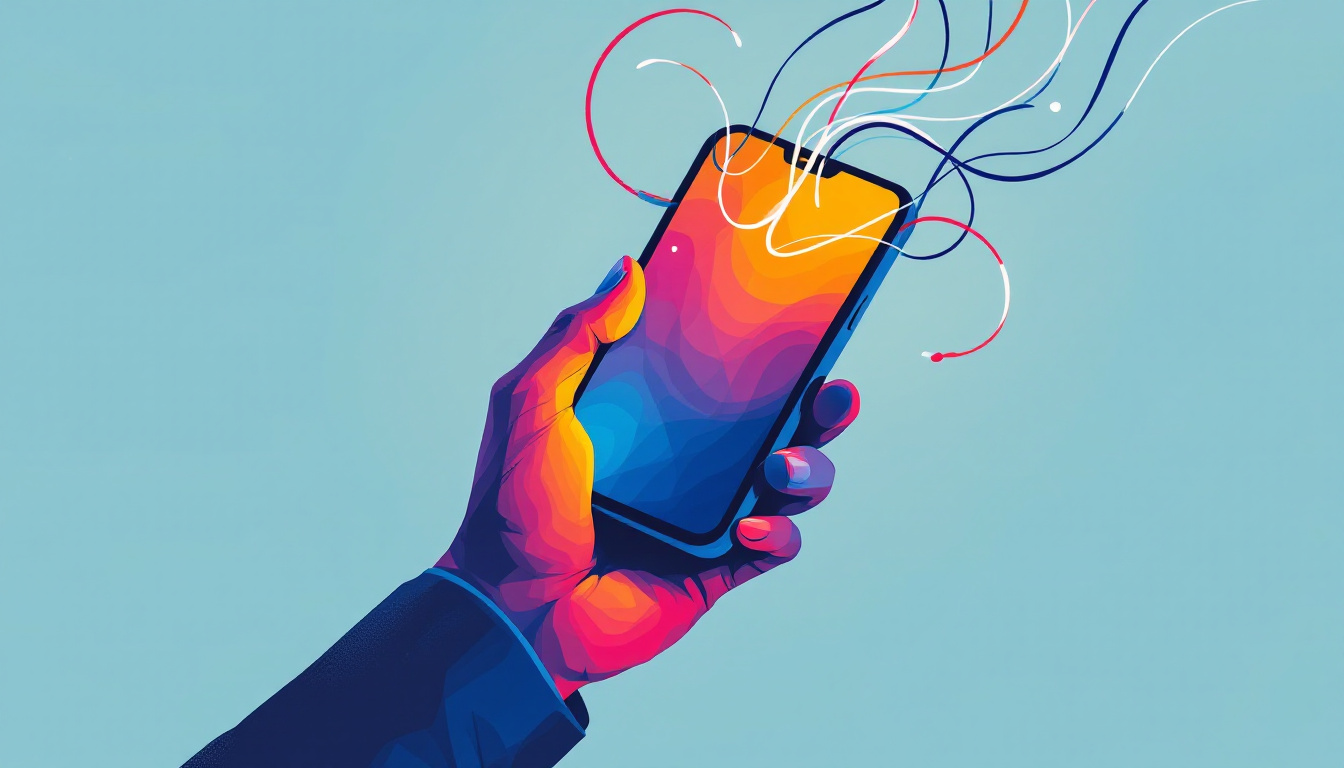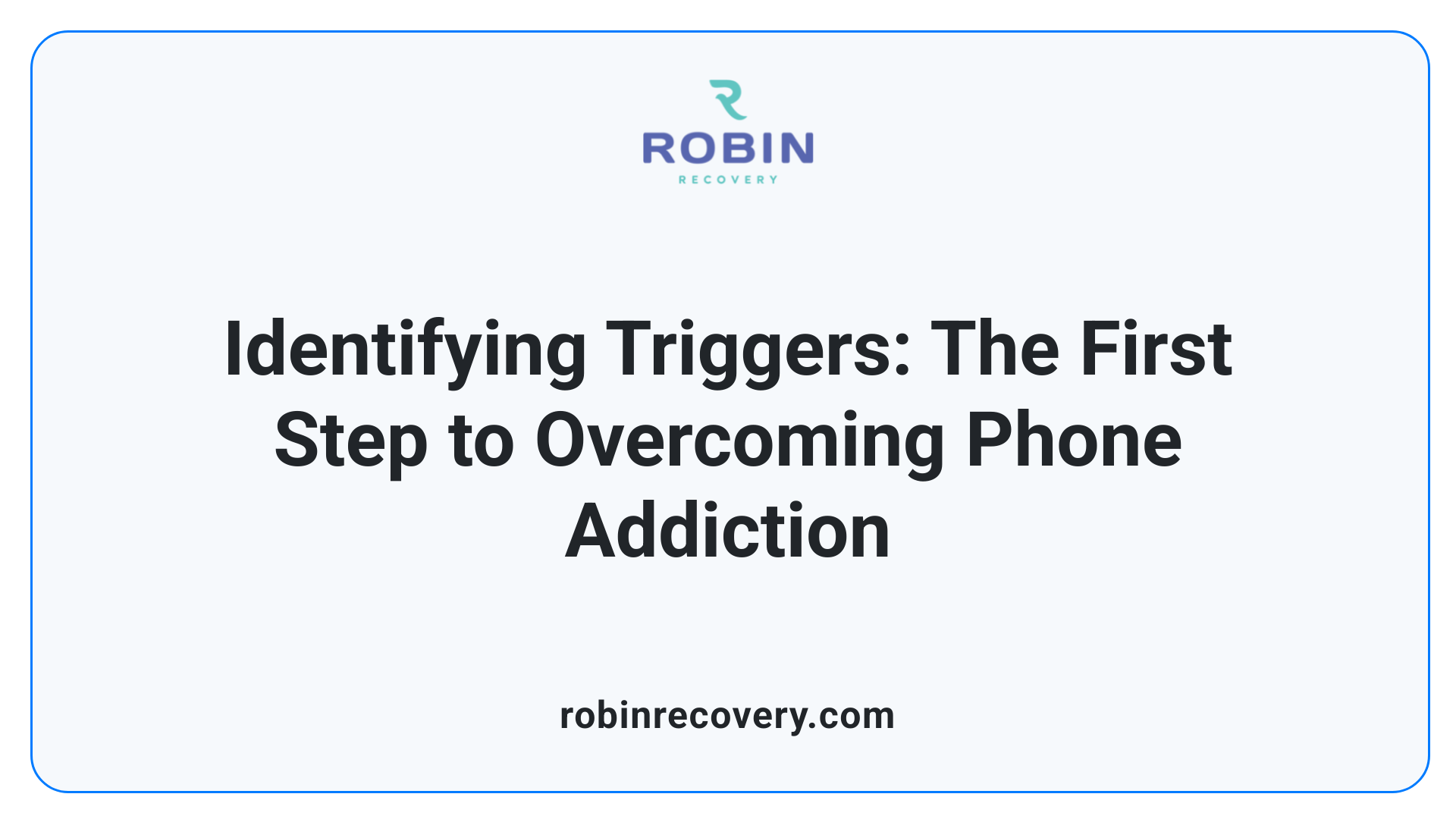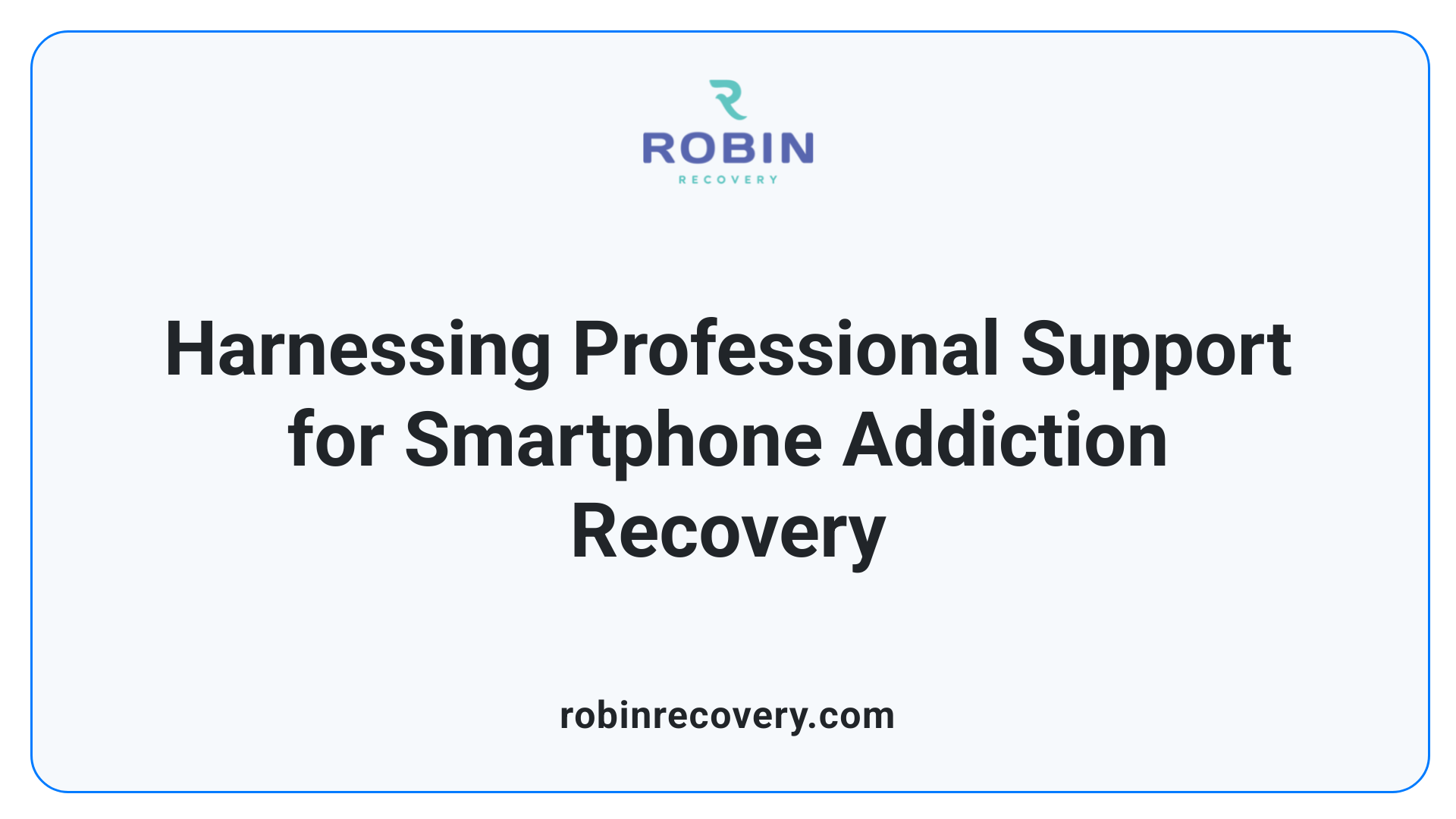How to Stop Phone Addiction

Understanding the Problem
In our hyper-connected world, smartphones have become indispensable tools for communication, work, and entertainment. However, the line between essential use and addiction is increasingly blurred. Excessive smartphone use is linked to disruptions in daily life, mental health issues, and diminishing real-world relationships. It's crucial to recognize these patterns and explore effective strategies to reclaim control over our device-centric lives.
Recognizing Triggers and Signs of Phone Addiction

Understanding Phone Addiction Triggers
Smartphone addiction often emerges from specific triggers that prompt users to reach for their devices. Common triggers include feelings of loneliness, boredom, or anxiety. When experiencing such emotions, many instinctively turn to their phones for distraction or comfort. By acknowledging these feelings and recognizing when they arise, individuals can take proactive steps towards addressing their phone habits.
Identifying Signs of Phone Addiction
Recognizing the warning signs of phone addiction is crucial for effective intervention. Symptoms may include:
- Compulsive Checking: Frequently grabbing your phone without purpose, even if you know there are no new notifications.
- Neglecting Relationships: Prioritizing smartphone use over face-to-face interactions, leading to isolation.
- Anxiety When Offline: Feeling restless, anxious, or irritable when unable to access your device.
- Exceeding Screen Time Limits: Setting limits yet consistently exceeding them, indicating a loss of control.
- Using Phones as Coping Mechanisms: Relying on your smartphone to manage negative emotions rather than addressing them through healthier outlets.
How Can I Stop Being Addicted to My Phone?
To stop being addicted to your phone, start by recognizing the signs of addiction, such as neglecting personal relationships and feeling anxious when you can't access your device. Gradually reduce your phone usage by setting specific time limits for checks, using apps that restrict access, and engaging in alternative activities to fill your time. It's important to practice mindfulness about your usage patterns and prioritize face-to-face interactions over digital ones. Additionally, consider developing skills to manage emotions and cope with difficult situations, which can help reduce dependence. Remember, seeking guidance from reliable sources like HelpGuide.org can provide you with trustworthy strategies to regain control over your smartphone habits.
Strategies for Reducing Smartphone Dependency

What are effective strategies to reduce phone addiction?
Reducing smartphone addiction requires a multifaceted approach that prioritizes real-life interactions and mental well-being. Here are some effective strategies:
- Establish Clear Boundaries: Set specific screen time limits to control usage. For instance, allocate a particular hour of the evening for social media while avoiding aimless scrolling.
- Maintain Device Diversity: Use different devices for various tasks to minimize prolonged smartphone engagement. Consider switching to a tablet or computer for browsing instead of your phone.
- Turn Off Push Notifications: Disabling notifications for non-essential apps lessens distractions and the constant temptation to check your phone.
- Create Phone-Free Zones: Designate certain times or places, like during meals or in the bedroom, as phone-free to encourage more meaningful connections with others and improve sleep quality.
- Track and Manage Screen Time: Use applications designed to monitor your phone usage. Keeping apps out of sight or limiting them to your screen can also reduce urges to engage with your phone.
- Turn on Grayscale Mode: Switching your phone to grayscale can diminish its visual appeal and reduce time spent on it, as many apps utilize color to engage users.
Incorporating these strategies not only fosters healthier smartphone use but also supports emotional well-being and enhances personal interactions.
The Role of Professional Help and Support Groups

Can phone addiction be cured?
Smartphone addiction can be effectively managed and treated, though it may not be fully cured in the traditional sense. Treatment options include cognitive-behavioral therapy (CBT), which has proven effective for a variety of behavioral addictions, such as internet and gambling addiction. CBT helps individuals reshape their behaviors by exploring the underlying psychological issues that contribute to dependency on smartphones.
In addition to therapy, individuals can establish personal rules for their device usage. For example, using apps that monitor and limit screen time can boost self-discipline and awareness. Setting specific boundaries around phone interactions, like designated phone-free times, encourages healthier habits.
Support Groups
Support groups are another vital resource for those struggling with smartphone addiction. Programs such as those offered by the Restart Center provide community support to help individuals connect with others facing similar challenges. Engaging in these groups often fosters accountability and shared strategies for reducing reliance on smartphones.
Regular participation in meetings can promote emotional well-being while individuals navigate their recovery journeys. Recognizing the psychological and behavioral patterns of their smartphone use empowers people to address the root causes of their addiction. Ultimately, a combination of professional help and community support forms a robust strategy for managing smartphone dependency.
Implementing Daily Routines to Curb Phone Usage

How do you break the phone habit?
To effectively break the phone habit, it’s essential to engage in offline activities that captivate your attention. This could mean diving into a good book or spending time outdoors, where the desire to share these experiences online is minimized. Tracking your phone usage through dedicated apps can reveal patterns of compulsive use, motivating you to cut back.
Creating phone-free routines
Establishing designated tech-free times or zones can significantly enhance your ability to disengage from your smartphone. For instance, set rules against phone use during family meals or social gatherings, fostering deeper connections and distractions-free interactions. Additionally, consider incorporating traditional tools like an alarm clock to diminish early morning phone checks, promoting a more peaceful start to your day.
Designating tech-free zones
Specific spaces should be reserved for phone-free interactions. Designate areas in your home, like the dining room or living room, where phones are not allowed. This reinforces a commitment to connect with the people around you rather than your device. Consider also taking a periodic break from phones entirely—such as a weekend—allowing you to reset habits and focus on nurturing in-person relationships.
In summary, by leveraging mindfulness and intentionality in your daily routines, you can significantly mitigate smartphone overuse and cultivate richer, more meaningful interactions.
Understanding the Psychological Impact of Smartphone Usage
How Does Smartphone Use Affect Mental Health?
The impact of excessive smartphone usage on mental health is increasingly alarming. Reports indicate a link between high smartphone engagement and feelings of anxiety, loneliness, and depression. Users often turn to their devices as coping mechanisms for these negative emotions, replacing meaningful in-person interactions with digital engagement. This shift can lead to a cycle of dependence, where users seek validation through likes and messages rather than real-life connections, amplifying feelings of isolation.
What Role Does Addiction and Brain Chemistry Play?
Smartphone addiction, often referred to as 'nomophobia', shares characteristics with other behavioral addictions. Chronic smartphone use can affect brain chemistry, particularly gamma-aminobutyric acid (GABA), a neurotransmitter involved in regulating anxiety. Just as with substance use disorders, excessive engagement with smartphones has been found to alter cognitive functions, including memory and decision-making abilities.
This addiction leads users to experience compulsive behavior, often checking their phones even without notifications. Such patterns not only disrupt daily life but also heighten anxiety — users feel restless without immediate access to their devices. These insights underscore the critical need for mindful engagement with smartphones to preserve mental health and foster meaningful relationships.
Replacing Digital Habits with Engaging Alternatives

What Alternative Activities Can Replace Smartphone Use?
To mitigate smartphone addiction, finding engaging activities that do not involve screens is crucial. Consider the following alternatives:
- Hobbies: Pursue a craft like painting, knitting, or gardening.
- Reading: Opt for physical books or magazines to stimulate your mind without a screen.
- Physical Exercise: Regular activities like swimming, jogging, or yoga can enhance your physical and mental well-being.
- Social Gatherings: Schedule coffee dates or join community groups to connect with friends and meet new people.
- Outdoor Activities: Hiking, biking, or simply enjoying nature can serve as a refreshing break from device usage.
How Can Mindfulness Assist in Combating Smartphone Addiction?
Incorporating mindfulness practices can also support your journey to reduce phone dependency. Here's how:
- Present Moment Awareness: Engage in mindfulness to cultivate presence in daily activities, fostering enjoyment away from screens.
- Meditation: Dedicate a few minutes daily to meditate, helping reduce anxiety and improve focus.
- Breathing Exercises: Practicing deep breathing when compelled to use your phone can interrupt the urge.
- Set Intentions: Establish clear intentions for your daily interactions, allowing you to prioritize what truly matters, both online and offline.
By employing these engaging alternatives and mindfulness techniques, you can gradually reclaim control over your life and reduce excessive smartphone use.
The Social Impact of Phone Addiction
How phone use affects relationships
Excessive smartphone use can have a significant negative impact on relationships. When individuals prioritize their phones over face-to-face interactions, it creates barriers to meaningful connections. For instance, phones often distract users during family dinners or social gatherings, leading to a decline in direct communication. This displacement of engagement can cause feelings of isolation among family and friends who may feel neglected or less valued.
Social interactions vs. digital engagement
In an era of constant connectivity, the quality of social interactions may suffer. While social media facilitates connections, it often fosters superficial engagement rather than genuine relationships. Studies indicate that frequent phone checks can lead to compulsive behavior, where users struggle to resist the urge to scroll through feeds instead of engaging with those physically present. This interference in social settings diminishes deep, face-to-face conversations, potentially leaving users feeling more anxious or lonely.
In essence, while smartphones offer incredible convenience, they can also lead to lost opportunities for building strong, authentic relationships. Establishing boundaries, such as creating phone-free zones or times, can help restore balance, allowing individuals to connect meaningfully with those around them.
Managing Phone Usage Through Technology
Using apps and features to limit phone use
Managing smartphone addiction often starts with leveraging technology to promote healthier usage habits. Numerous apps can help monitor and limit phone use effectively. For instance, apps like Space and Moment can track usage patterns, allowing users to see how often they engage with their devices. These apps essentially serve as an inventory of smartphone habits, offering insights into daily usage, which can be particularly eye-opening for many.
Additionally, consider utilizing features built into smartphones for better control. Screen time trackers can provide detailed reports on how long you spend on each app. This data can help set realistic boundaries and identify problematic usage.
Do Not Disturb and other phone settings
One effective feature to combat phone addiction is the Do Not Disturb setting. This allows users to silence notifications from all but essential contacts, reducing the temptation to check the phone constantly. Moreover, by scheduling specific times for this setting, users can enhance focus, especially during work hours or social gatherings.
Another strategy involves modifying notifications altogether. Turning off unneeded alerts minimizes distractions, allowing users to engage more mindfully with their surroundings.
Establishing designated phone-free zones or times, such as during meals or right before bed, promotes interpersonal connections and improves sleep quality. By employing these tech features and apps, individuals can take meaningful steps toward reducing smartphone dependency and reclaiming valuable time for more fulfilling activities.
Community and Peer Support in Overcoming Phone Addiction
Importance of Community Support
Seeking community and peer support is crucial when tackling phone addiction. Sharing experiences with others facing similar challenges can enhance understanding and provide encouragement. Support groups, such as Internet and Technology Addicts Anonymous (ITAA), foster a sense of belonging and accountability. Connection with others helps to normalize struggles, reducing feelings of isolation often associated with smartphone dependency.
Sharing Experiences and Strategies
In group settings, individuals can exchange effective strategies for managing smartphone use. For instance, discussing triggers and coping mechanisms unveils a wealth of practical advice, such as disabling notifications or designing phone-free zones. Furthermore, hearing success stories from others can motivate individuals to persist in their efforts, reinforcing the notion that recovery is a shared journey.
In summary, community support significantly contributes to overcoming phone addiction, providing emotional backing and useful strategies that pave the path to healthier digital habits.
The Future of Smartphones and Digital Well-being
Trends in digital wellness
As our reliance on smartphones continues to rise, a growing awareness surrounding digital well-being is taking center stage. With an average user engaging with their phone over 2,600 times a day, it’s crucial to focus on cultivating healthier usage habits. Experts suggest that establishing designated phone-free times can reintegrate mindfulness into everyday life. Popular strategies include setting specific times for checking notifications or limiting social media interaction to short, defined periods each day.
Equipping users with tools to monitor their engagement, such as apps that track screen time, is becoming more common. These tools encourage accountability and provide users insight into their habits, helping foster a more intentional relationship with their devices.
The role of companies and consumers
Both companies and consumers play a vital role in shaping the landscape of smartphone use. As awareness of smartphone addiction grows, designers are encouraged to create features that prioritize user well-being. For instance, options like 'Do Not Disturb' and settings to limit notifications help mitigate distractions.
Conversely, consumers must also be proactive. They are increasingly questioning the motives behind app designs that encourage prolonged engagement. By fostering understanding about the psychological strategies employed by app developers, users can be more mindful of their smartphone usage and make conscious choices to engage less.
Ultimately, a mutual effort from both tech companies and users will lead to a healthier balance, contributing to improved mental health and well-being amid the digital landscape.
Moving Forward
Phone addiction is a growing concern, but it's possible to regain control and develop a healthier relationship with technology. By setting thoughtful boundaries, seeking support, and engaging in meaningful offline activities, individuals can mitigate the impacts of excessive smartphone use. Understanding the psychological and social dimensions of phone addiction is key to overcoming it. As we move towards a more digitally integrated future, it's essential to remain mindful of how we interact with our devices, ensuring technology enriches rather than detracts from our lives.
References
- Phone Addiction: Warning Signs and How to Get Help - HelpGuide.org
- 7 Proven Ways to Break Your Cell Phone Addiction
- Your Phone Addiction Makes You Less Happy. This Might Help.
- How to Break Smartphone Addiction: Tips and Symptoms
- How to Stop Being 'Addicted' to Your Phone: 5 Tips | Psych Central
- How to Kill Your Phone Addiction with 4 Settings, 1 Hair Band, and a ...
- Phone Addiction: Warning Signs And Treatment
